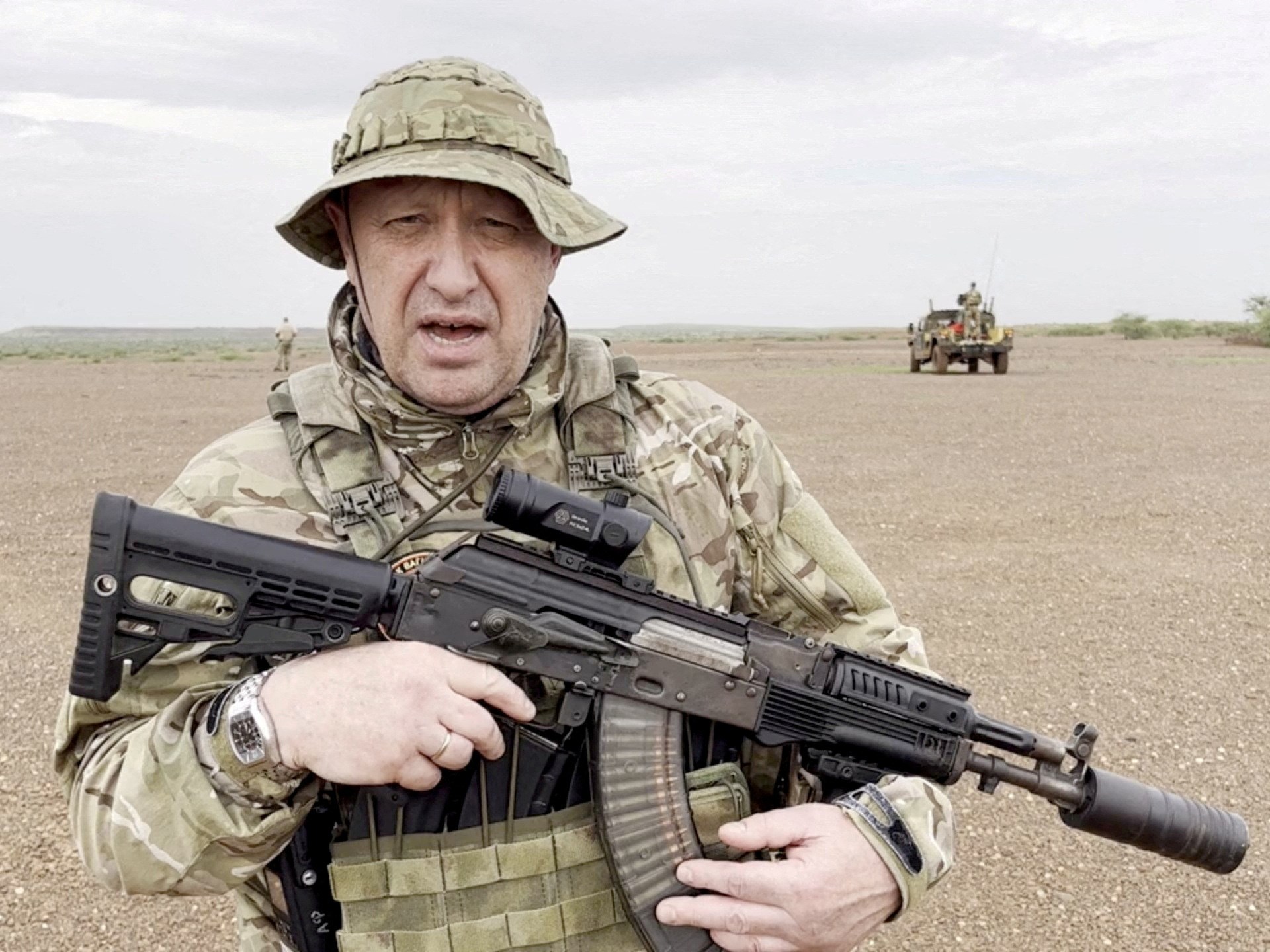World
Charismatic leader is gone but Wagner will survive in Africa, analysts say

Yevgeny Prigozhin, head of Russia’s Wagner mercenary group, just left Mali where he filmed a video pledging to make “Africa even more free” before he presumably perished in a plane crash in his home country.
His apparent death – it has yet to be officially confirmed – has sparked concerns for some client governments in Africa who rely on his unique services.
Patronage of Prigozhin’s private military force has been on the rise in recent years since some African governments started turning towards Russia as an alternative international partner in their fight against rising insecurity from various armed groups.
President Faustin-Archange Touadéra of the Central Africa Republic (CAR) was the first to turn to the feared militia in 2018, but the shifting sands of democratic governments that have seen a rise in military takeovers in the Sahel region opened the door widely for Wagner.
Across the Sahel and central Africa, armed groups have continued to expand rapidly, their rise coinciding with protests against former colonial power France, which still wields enormous influence across the region.
Prigozhin was the face of the group’s operations as he crisscrossed between Ukraine and Africa, pushing his stock-in-trade. His death, analysts say, will put a clog in the Wagner machine in Africa.
“Progozhin himself was this incredibly charismatic, larger-than-life figure who had the managerial and business abilities to somehow bring all of these disparate entities and people together,” said John Lechner, a security analyst and author of a forthcoming book on the Wagner Group.
Will expansion continue?
When Prigozhin staged an aborted mutiny in Russia in June, exactly two months before his death, clouds began to hover over the military-business empire Prigozhin built on the continent.
Sergey Lavrov, Russia’s foreign minister, at the time said the group’s operations would continue. But the fatal crash that claimed his life and his trusted lieutenant Dmitry Utkins has raised questions about what happens next.
“It does not very much change in places like Mali and CAR because there were already relationships and contracts. And the Russians said they would honour those contracts. The real question is what happens in the countries Wagner was trying to expand its presence, places like Burkina Faso and Niger. Will that expansion continue under the Russian government?” Cameron Hudson, a senior associate in the Centre for Strategic and International Studies’s Africa programme, said.
The brief mutiny in Russia back in June was the climax of a growing schism between Prigozhin and the Ministry of Defence over the handling of the war in Ukraine. But African governments had also been caught in a delicate balancing act between the shadowy mercenary group and the Russian government.
The Malian coup-makers continue to refer to the armed group as “Russian instructors”, though CAR authorities are more forthcoming.
“CAR authorities have always been uncomfortable,” Charles Bouessel, senior analyst on CAR for International Crisis Group, told Al Jazeera.
“They did not know who to praise for Wagner’s assistance. Sometimes, they are thanking the Russian authorities and sometimes, they are thanking Prigozhin. But what they want is that the Russian assistance continues, and they would be cautious in expressing their opinion [on Prigozhin’s death] intimately.”
‘Degree of deniability’
Officials have expressed that their commitment was to Russia and not to the mercenary group itself. Fidele Gouandjika, an adviser to CAR’s president, told the media that Prigozhin’s death would not change the relationship with Moscow.
Experts have said even though Prigozhin’s charm offensive will be notably absent, the Kremlin will ensure to maintain its influence on the continent.
“There are a lot of Russian institutions benefitting from Russia’s presence in Africa and they will want to see those relationships continue,” Lechner said.
However, the tussle between Wagner and the GRU, Russia’s military intelligence agency, might recalibrate the diplomatic relationship between African governments and Russia.
“I think they are going to have a rethink of their approach … Countries that were considering a relationship with Wagner are all going to think if they want the same kind of relationship with Moscow. Because with the Wagner Group, there was some degree of deniability,” said Hudson.
‘Claustrophobic environment’
Niger is the latest country to eye Wagner. Since the presidential guard seized power, it has publicly fallen out with the West. The regional bloc ECOWAS has threatened to invade the country in order to restore President Mohamed Bazoum, who was removed in a coup on July 26.
With Prigozhin’s death, Wagner’s appeal to new countries seeking Wagner’s military assistance might dwindle, but analysts have said the militia can still make inroads into new territories.
“I think we should not be surprised if Wagner still shows up in Niger, even after Prigozhin’s death,” Lechner told Al Jazeera. “We are still in a claustrophobic environment where African governments looking to partner with outside countries on security have relatively few choices.”
Since 2020, there have been nine coups in Africa, according to a count by SBM, a geopolitical advisory firm in Nigeria. In this period, five of the 15 ECOWAS member nations are now under military rule.
This spate of coups, experts said, is a recipe for mercenary groups as military governments are pushing to consolidate their grip on power amid pressure from the West, and the decline of democratic governments will continue to invite such private military interventions.
“Illegitimate governments in Africa need security assistance for their hold on power and regime. That is the point of all of these: it is not the supply of armed mercenaries, it is the demand of armed mercenaries,” Hudson said.

World
Italian state railways plans 1.3 bln euro investment in solar plant

World
Christmas in Puerto Rico is a 45-day celebration with caroling, festive decorations, family feasts and more

Christmas, Navidad in Puerto Rico, extends far beyond Dec. 25.
The island proudly proclaims itself as having the “longest holiday season in the world,” according to the website Discover Puerto Rico.
On average, the holiday festivities in Puerto Rico last about 45 days, per the source, commencing right after Thanksgiving, and stretching all the way through mid-January.
The Christmas season in Puerto Rico typically lasts around 45 days. (iStock)
HOW TO SAY ‘MERRY CHRISTMAS’ IN 10 LANGUAGES TO FRIENDS AROUND THE WORLD
The holiday season in Puerto Rico is full of rich traditions beloved by families.
One tradition those who visit Puerto Rico will immediately notice during the holiday season is decorations.
In Puerto Rico, decorations are typically put up by Thanksgiving, and kept up until the season concludes in mid-January, with opportune picture moments at every corner.
Parrandas, Christmas caroling, is a holiday staple.
17 SECRET TRAVEL TIPS FOR FALL AND WINTER THAT AREN’T SO SECRET AFTER ALL
Carolers choose houses of family and friends to visit, typically starting around 10 p.m., performing aguinaldos (traditional Christmas songs), with not only their voices, but often with instruments as well, according to Discover Puerto Rico.
The group you begin caroling with is likely not the same group you end with.
In Puerto Rico, when carolers visit a house, they’ll often stop inside for conversation, food and drink before moving to the next residence.

Coquito is a popular beverage enjoyed during the holiday season in Puerto Rico. Coconut, vanilla and rum are among the ingredients. (Mayra Beltran/Houston Chronicle via Getty Images)
Usually, the residences of the house visited will join the group for the next house, according to Discover Puerto Rico.
CHRISTMAS TREES IN GERMANY WERE DECORATED WITH APPLES INSTEAD OF ORNAMENTS IN THE 1600S FOR ‘ADAM AND EVE DAY’
A night of serenading loved ones can last quite a while, often stretching into the early morning hours of the following day, according to the source.
The biggest day of the holiday season in Puerto Rico actually isn’t Christmas, but instead, the night before.
In Puerto Rico, Dec. 24 is Nochebuena. On that day, loved ones gather for the exchange of gifts, caroling and a large feast.
Many families will also attend a midnight Mass on the day, known as Misa de Gallo.
FLIGHT ATTENDANTS REVEAL THE SURPRISING DAY TO TRAVEL AHEAD OF THE CHRISTMAS RUSH
After Christmas passes, the festivities go on in Puerto Rico.
Another big event in the holiday lineup is Three Kings Day on Jan. 6, a holiday that “commemorates the visit that the Three Wise Men paid to Jesus after his birth,” according to Discover Puerto Rico.
On the eve of the day, children fill up a shoebox with grass to be left for camels to munch on while the Three Kings leave behind gifts for them, according to PuertoRico.com.
For a particularly festive Three Kings Day, Juana Díaz is the place to go, as it hosts the largest celebration in Puerto Rico for the holiday. In Juana Díaz, there is an annual festival and parade in honor of Three Kings Day that brings together over 25,000 people every year, according to Discover Puerto Rico.

Gifts are primarily exchanged between loved ones on Christmas Eve in Puerto Rico. (iStock)
Then, eight days later is Octavitas, a post-holiday celebration where families get together and celebrate one last time for the season.
The end of the holiday season is marked with the San Sebastián Street Festival.
This festival, spanning over multiple days, takes place in Old San Juan, and is filled with live music, dancing, shopping and parades.
World
Small plane crashes into Brazil town popular with tourists, killing 10

Twin-engine plane crashed in largely residential neighborhood of Gramado shortly after takeoff, authorities say.
A small plane has crashed into a tourist hotspot in southern Brazil, killing all 10 people on board and injuring more than a dozen people on the ground, officials have said.
The twin-engine Piper PA-42-1000 hit the chimney of a home and the second floor of a different house before crashing into a shop in a largely residential neighbourhood of Gramado shortly after takeoff from Canela, Brazil’s Civil Defense agency said on Sunday.
Rio Grande do Sul Governor Eduardo Leite told a news conference that the aircraft’s owner and pilot, Luiz Claudio Galeazzi, was killed along with nine members of his family.
Leite said that 17 people on the ground were injured, 12 of whom were still receiving treatment in hospital.
Galeazzi’s company, Galeazzi & Associados, confirmed that its CEO and Galeazzi’s wife and three daughters had died in the crash.
“Luiz Galeazzi will be forever remembered for his dedication to his family and for his remarkable career as a leader of Galeazzi & Associados,” the company said in a post on LinkedIn.
“In this moment of immense pain, Galeazzi & Associados is deeply grateful for the expressions of solidarity and affection received from friends, colleagues and the community. We also sympathize with all those affected by the accident in the region.”
Gramado, located in the Serra Gaucha mountains, is a popular destination for vacationers, especially during the Christmas season.
The crash comes a little more than a year after Brazil suffered its worst air disaster in nearly two decades when a twin-engine plane crashed in the southeastern city of Vinhedo, killing all 62 people on board.
-

 Politics1 week ago
Politics1 week agoCanadian premier threatens to cut off energy imports to US if Trump imposes tariff on country
-
/cdn.vox-cdn.com/uploads/chorus_asset/file/25789444/1258459915.jpg)
/cdn.vox-cdn.com/uploads/chorus_asset/file/25789444/1258459915.jpg) Technology1 week ago
Technology1 week agoOpenAI cofounder Ilya Sutskever says the way AI is built is about to change
-

 Politics1 week ago
Politics1 week agoU.S. Supreme Court will decide if oil industry may sue to block California's zero-emissions goal
-
/cdn.vox-cdn.com/uploads/chorus_asset/file/25546252/STK169_Mark_Zuckerburg_CVIRGINIA_D.jpg)
/cdn.vox-cdn.com/uploads/chorus_asset/file/25546252/STK169_Mark_Zuckerburg_CVIRGINIA_D.jpg) Technology1 week ago
Technology1 week agoMeta asks the US government to block OpenAI’s switch to a for-profit
-

 Business1 week ago
Business1 week agoFreddie Freeman's World Series walk-off grand slam baseball sells at auction for $1.56 million
-
/cdn.vox-cdn.com/uploads/chorus_asset/file/23951353/STK043_VRG_Illo_N_Barclay_3_Meta.jpg)
/cdn.vox-cdn.com/uploads/chorus_asset/file/23951353/STK043_VRG_Illo_N_Barclay_3_Meta.jpg) Technology1 week ago
Technology1 week agoMeta’s Instagram boss: who posted something matters more in the AI age
-
News1 week ago
East’s wintry mix could make travel dicey. And yes, that was a tornado in Calif.
-
/cdn.vox-cdn.com/uploads/chorus_asset/file/24924653/236780_Google_AntiTrust_Trial_Custom_Art_CVirginia__0003_1.png)
/cdn.vox-cdn.com/uploads/chorus_asset/file/24924653/236780_Google_AntiTrust_Trial_Custom_Art_CVirginia__0003_1.png) Technology2 days ago
Technology2 days agoGoogle’s counteroffer to the government trying to break it up is unbundling Android apps
















